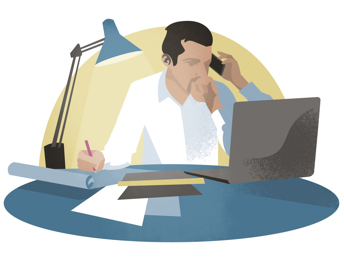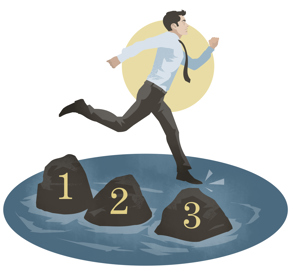Take the edge off the work pressure
Expert on stress: Small changes can make a big difference when tasks are accumulating
A high work pressure has become an everyday reality for many financial sector employees. It is possible to tackle the pressure of business yourself with simple techniques and practical everyday routines, says Bjarne Toftegård, stress coach, author, speaker and owner of the company Forebyg Stress (Literally: prevent stress).
The smallest measures almost always make the biggest difference, he adds.
"In the short term, stress may enhance your performance slightly. But it's much more productive to work in a flow state. You may have experienced this if you’ve worked from home or come in early and got a whole lot done. The trick is to simulate this," explains Bjarne Toftegård, serving up a series of practical tips that he knows from experience will help.
"But remember: It isn’t enough to read an article. To prevent stress, you must change your mindset, and new routines must be repeated – again and again – for them to become lasting habits," he adds.
1. Stop multitasking
Multitasking is the most productive way to be unproductive. Sort your tasks during the day and do one thing – or one type of task – at a time. For example, avoid falling into the habit of clicking in and out of emails in the middle of other tasks. Instead, try setting specific blocks of time during the day for emails. Unless, of course, it's your job to keep an eye on the email all the time.

2. Fewer interruptions
Interruptions cannot be avoided, but they can be limited. Here are three easy ways to do so:
- Turn off all unnecessary sounds and notifications on your phone, tablet and computer so they do not distract you.
- You need to clear your mind of inner distractions and thoughts. Do not use your head as a bulletin board for your tasks. Make lists instead. Once the tasks are out of your head, you can start prioritising them.
- Agree with your colleagues when it is acceptable to disturb each other and how to signal it. It could be a flag, a red or green light or an agreement not to disturb those wearing a headset. You could also agree on ‘do not disturb’ time, such as from the top of the hour until a quarter to the next.
3. Prioritise a maximum of three tasks
Studies have shown that those who complete their three most important tasks each day are high-performers. One method is to make a to-do list the day before, choosing no more than three tasks that are the most important. You will then complete the three tasks as quickly as possible on the day after. You are free to do more tasks, but only very important new tasks may take precedence over the top three priorities on your list.

4. Saying yes, is also saying no
Saying yes to something also means saying no to something else. Many of us have trouble saying no and therefore end up spending time and energy on the wrong things. So, when you say yes, ask yourself what you're saying no to. This can make it easier to prioritise.
5. From ‘I must’ to ‘I choose’
If you always think about your tasks as must, should and have to, you put yourself in the victim role. Try inserting choose instead. You will then assume a more active and actionable role. Are you telling everyone that you do not have enough time? Instead, think that there is too much that you must and want to do, requiring you to choose. Then you will be acting instead of being the victim.
6. Remember to take breaks
If you want to be productive, you need to take breaks. Although working tirelessly without breaks may feel more productive, studies have shown that this is not the case. Some are happy working for 25 minutes with a 5-minute break, while others prefer, for example, working for 45 minutes and a 10-minute break. The best thing you can do during breaks is to make small talk with colleagues. Good relationships prevent stress and increase productivity.

7. Pat yourself on the back
Practice being satisfied with what you actually get done. Often, we do not think about all the things we accomplished, but are blinded by the one task that still remains. So, look at the list and be happy that you accomplished the three most important things.
Remember to acknowledge your own efforts – physically patting yourself on the back can work wonders. Acknowledgment from your manager and colleagues is important, but even more so is your own acknowledgment.

8. Perhaps 80 per cent will do
The quality of your work also matters when time and tasks are to come together. Sometimes, we need to do things a bit less perfectly than what we would like. Perhaps 80 per cent is appropriate given the time available. Talk to your manager and set expectations about how much time you can spend on a task and what you can achieve in that time.





